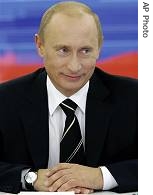2006年VOA标准英语-Russian-European Relations Strained on Eve of S(在线收听)
By Bill Gasperini
Moscow
23 November 2006
Relations between Russia and the European Union have come under strain just as Russian President Vladimir Putin is due to meet European leaders Friday in Finland. Disputes over agricultural imports and energy issues have arisen in an increasingly complex relationship. Bill Gasperini has this preview of the summit from Moscow.
----
 |
| Vladimir Putin |
Russian officials are rejecting renewed calls from the European Union to sign a new energy charter that would open its oil and gas market to foreign investment.
Brussels says the charter is necessary to boost security and efficiency, especially in the pipeline network from Russia that supplies the European Union with about one-third of its energy needs. Moscow insists it must retain control over, what the Kremlin calls, Russia's strategic resources.
But this long-standing dispute is overshadowed by an open split over agricultural imports.
New EU member Poland has blocked Europe's plan to open talks at the summit on a new cooperation agreement with Russia until Moscow agrees to lift a ban on Polish food products. The ban was imposed a year ago due to alleged violations of health regulations.
And Russia's envoy to the European Union, Sergei Yastrzhembsky, says Brussels should not allow one member country to hold up progress on improving relations.
Mr. Yastrzhemsky says that the ball is in Europe's court and that it holds all the cards in terms of working out its problems at home.
Meanwhile, Russia is threatening to ban food and dairy imports from the European Union on January First, amid new concerns about hygiene in Bulgaria and Romania, which are due to join the bloc on that date.
An EU spokesman says such a total ban would be unjustifiable because Europe has taken precautions to insure sanitation and safety on all products within its single market.
It remains unclear whether the threatened ban is a response to Poland's move. But Russian officials have long complained that countries from the former Soviet bloc, such as Poland, are pursuing anti-Russian policies due to bitterness left over from the Soviet era.
Other tensions exist over issues such as the enforcement of environmental standards, as Russia and its EU neighbors grapple with an increasingly complex relationship.